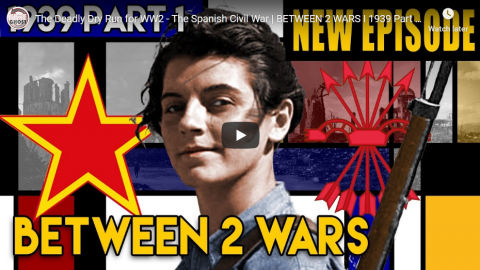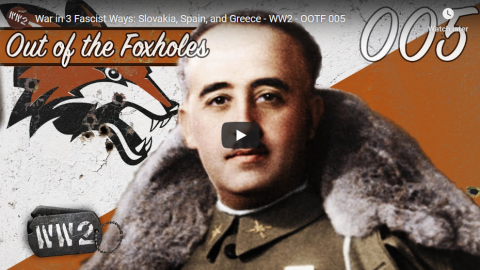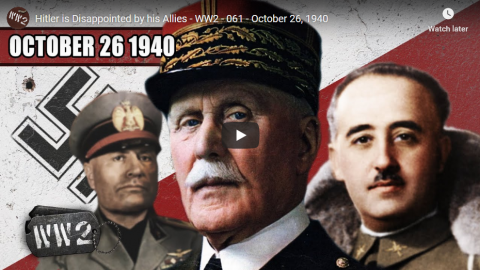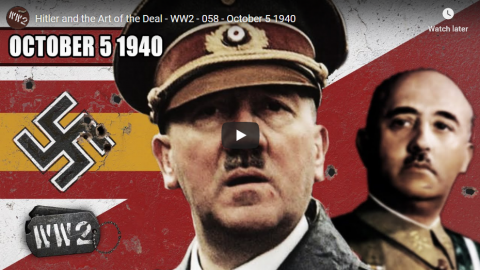The Great War
Published 24 Feb 2023The Rif War between Spain and the Rif Republic gave rise to a young Spanish officer named Francisco Franco — who later would become Spanish dictator. After Spain had almost lost the war against the Rifi people, they got help from France and WW1 hero Philippe Pétain.
(more…)
February 25, 2023
Rise of Franco – The Spanish Rif War 1921-1926
July 31, 2022
QotD: Intervention and non-intervention in the Spanish Civil War
The outcome of the Spanish war was settled in London, Paris, Rome, Berlin — at any rate not in Spain. After the summer of 1937 those with eyes in their heads realized that the Government could not win the war unless there were some profound change in the international set-up, and in deciding to fight on Negrin and the others may have been partly influenced by the expectation that the world war which actually broke out in 1939 was coming in 1938. The much-publicized disunity on the Government side was not a main cause of defeat. The Government militias were hurriedly raised, ill-armed and unimaginative in their military outlook, but they would have been the same if complete political agreement had existed from the start. At the outbreak of war the average Spanish factory-worker did not even know how to fire a rifle (there had never been universal conscription in Spain), and the traditional pacifism of the Left was a great handicap. The thousands of foreigners who served in Spain made good infantry, but there were very few experts of any kind among them. The Trotskyist thesis that the war could have been won if the revolution had not been sabotaged was probably false. To nationalize factories, demolish churches, and issue revolutionary manifestoes would not have made the armies more efficient. The Fascists won because they were the stronger; they had modern arms and the others hadn’t. No political strategy could offset that.
The most baffling thing in the Spanish war was the behaviour of the great powers. The war was actually won for Franco by the Germans and Italians, whose motives were obvious enough. The motives of France and Britain are less easy to understand. In 1936 it was clear to everyone that if Britain would only help the Spanish Government, even to the extent of a few million pounds’ worth of arms, Franco would collapse and German strategy would be severely dislocated. By that time one did not need to be a clairvoyant to foresee that war between Britain and Germany was coming; one could even foretell within a year or two when it would come. Yet in the most mean, cowardly, hypocritical way the British ruling class did all they could to hand Spain over to Franco and the Nazis. Why? Because they were pro-Fascist, was the obvious answer. Undoubtedly they were, and yet when it came to the final showdown they chose to stand up to Germany. It is still very uncertain what plan they acted on in backing Franco, and they may have had no clear plan at all. Whether the British ruling class are wicked or merely stupid is one of the most difficult questions of our time, and at certain moments a very important question. As to the Russians, their motives in the Spanish war are completely inscrutable. Did they, as the pinks believed, intervene in Spain in order to defend Democracy and thwart the Nazis? Then why did they intervene on such a niggardly scale and finally leave Spain in the lurch? Or did they, as the Catholics maintained, intervene in order to foster revolution in Spain? Then why did they do all in their power to crush the Spanish revolutionary movements, defend private property and hand power to the middle class as against the working class? Or did they, as the Trotskyists suggested, intervene simply in order to prevent a Spanish revolution? Then why not have backed Franco? Indeed, their actions are most easily explained if one assumes that they were acting on several contradictory motives. I believe that in the future we shall come to feel that Stalin’s foreign policy, instead of being so diabolically clever as it is claimed to be, has been merely opportunistic and stupid. But at any rate, the Spanish civil war demonstrated that the Nazis knew what they were doing and their opponents did not. The war was fought at a low technical level and its major strategy was very simple. That side which had arms would win. The Nazis and the Italians gave arms to the Spanish Fascist friends, and the western democracies and the Russians didn’t give arms to those who should have been their friends. So the Spanish Republic perished, having “gained what no republic missed”.
Whether it was right, as all left-wingers in other countries undoubtedly did, to encourage the Spaniards to go on fighting when they could not win is a question hard to answer. I myself think it was right, because I believe that it is better even from the point of view of survival to fight and be conquered than to surrender without fighting. The effects on the grand strategy of the struggle against Fascism cannot be assessed yet. The ragged, weaponless armies of the Republic held out for two and a half years, which was undoubtedly longer than their enemies expected. But whether that dislocated the Fascist timetable, or whether, on the other hand, it merely postponed the major war and gave the Nazis extra time to get their war machine into trim, is still uncertain.
George Orwell, “Looking back on the Spanish War”, New Road, 1943 (republished in England, Your England and Other Essays, 1953).
July 20, 2022
QotD: Fascism and the state
One way to tell if you’re dealing with an actual Fascist is whether your subject has that theory of state power. If he doesn’t, you might be dealing with (say) a garden variety conservative-militarist strongman like Admiral Horthy in Hungary. Rulers like that will kill you if you look like a political threat, but they’re not invested in totalitarianizing their entire society.
Occasionally you’ll get one of these like Francisco Franco who borrows fascist tropes as propaganda tools but keeps a tight rein on the actual Fascist elements in his power base (the Falange). Franco remained a conservative monarchist all his life and passed power to the Spanish royal family on his death.
This highlights one of the other big lies about Fascism; that it’s a “conservative” ideology. Not true. Franco, a true reactionary, wanted to preserve and if necessary resurrect the power relations of pre-Civil-War Spain. Actual Fascism aims at a fundamental transformation of society into a perfected state never seen before. All of its type examples were influenced by Nietzschean ideas about the transformation of Man into Superman; Fascist art glorified speed, power, technology, and futurism.
Eric S. Raymond, “Spotting the wild Fascist”, Armed and Dangerous, 2019-04-30.
March 26, 2020
The Deadly Dry Run for WW2 – The Spanish Civil War | BETWEEN 2 WARS I 1939 Part 1 of 3
TimeGhost History
Published 25 Mar 2020After years of political violence and strife, a military coup in 1936 finally brings Spain into all-out civil war. Mass executions and revolutionary upheaval, as the eyes of the world focus on the Iberian Peninsula.
Join us on Patreon: https://www.patreon.com/TimeGhostHistory
Watch part one of the Spanish Civil War (1936) here: https://youtu.be/ncUkPavahCU
Hosted by: Indy Neidell
Written by: Francis van Berkel
Directed by: Spartacus Olsson and Astrid Deinhard
Executive Producers: Bodo Rittenauer, Astrid Deinhard, Indy Neidell, Spartacus Olsson
Creative Producer: Joram Appel
Post-Production Director: Wieke Kapteijns
Research by: Francis van Berkel
Edited by: Daniel Weiss
Sound design: Marek KamińskiSources:
(Kutxa Photograph Library) – Brigadas de Navarra Photos,
EBNZ; HansenBCN – Emblem of Spanish Legion,
Foto Kutxateka – Eibar in Ruins,
Herbert Behrens / Anefo – Guernica Painting,
Dorieo – Battle of Brunete,From the Noun Project:
noun_Death by Icon Island,
noun_soldier by Wonmo Kang,
noun_Arm Sling by Sergey Demushkin,
noun_Government by Adrien Coquet,Photos from Color by Klimbim
Colorizations by:
– Daniel Weiss
– Julius Jääskeläinen
– Adrien Fillon – https://www.instagram.com/adrien.colo…
– Dememorabilia – https://www.instagram.com/dememorabilia/Soundtracks from Epidemic Sound:
– “Not Safe Yet” – Gunnar Johnsen
– “The Inspector 4” – Johannes Bornlöf
– “Watchman” – Yi Nantiro
– “Split Decision” – Rannar Sillard
– “Guilty Shadows 4” – Andreas Jamsheree
– “Disciples of Sun Tzu” – Christian Andersen
– “Last Point of Safe Return” – Fabien Tell
– “First Responders” – Skrya
– “One More Thought” – Johan Hynynen
– “Dark Beginning” – Johan Hynynen
– “Easy Target” – Rannar Sillard
– “The Charleston 3” – Håkan ErikssonA TimeGhost chronological documentary produced by OnLion Entertainment GmbH.
From the comments:
TimeGhost History
1 hour ago
Just in terms of the complexity of things, researching and writing this episode has been my biggest challenge so far. So much happens and at such a fast pace that it’s difficult to understand everything as it is, let alone get it into a chronological video that actually makes sense! The amount of actors both nationally and internationally gives you a feeling that you are writing about a continental, or even global, war rather than one in a relatively small country. It is this way for several reasons, a lot of which you’ll know if you watched our last episode on the Second Spanish Republic. But we’d be interested to see what you guys think about the Spanish Civil War? Why was it so complicated? Why does it hold so much significance beyond Spain’s borders? Why did it get so violent so quickly? Let us know what you think, we want to hear your opinions.Cheers, Francis.
November 6, 2019
War in 3 Fascist Ways: Slovakia, Spain, and Greece – WW2 – OOTF 005
World War Two
Published 5 Nov 2019What role did Slovakia play during the invasion of Poland? How did Franco view the war in Europe? And did Greece see an invasion coming? We answer all of this in this episode of Out of the Foxholes.
Submit your own question: https://community.timeghost.tv/c/Out-…
Join us on Patreon: https://www.patreon.com/TimeGhostHistory
Or join The TimeGhost Army directly at: https://timeghost.tvFollow WW2 day by day on Instagram @World_war_two_realtime https://www.instagram.com/world_war_t…
Join our Discord Server: https://discord.gg/D6D2aYN.
Between 2 Wars: https://www.youtube.com/playlist?list…
Source list: http://bit.ly/WW2sourcesHosted by: Indy Neidell
Produced and Directed by: Spartacus Olsson and Astrid Deinhard
Executive Producers: Bodo Rittenauer, Astrid Deinhard, Indy Neidell, Spartacus Olsson
Creative Producer: Joram Appel
Post Production Director: Wieke Kapteijns
Research by: Rune Vaever Hartvig
Edited by: Mikołaj Cackowski
Map animations: EastoryColorisations by Norman Stewart and Julius Jääskeläinen https://www.facebook.com/JJcolorization/
Eastory’s channel: https://www.youtube.com/channel/UCEly…
Archive by Screenocean/Reuters https://www.screenocean.com.A TimeGhost chronological documentary produced by OnLion Entertainment GmbH.
October 27, 2019
Hitler is Disappointed by his Allies – WW2 – 061 – October 26, 1940
World War Two
Published 26 Oct 2019Hitler finds out that not everyone is ready to do his bidding. Much to the frustration of Hitler, Franco, Petain and Mussolini all have their reasons to take the high road.
Join us on Patreon: https://www.patreon.com/TimeGhostHistory
Or join The TimeGhost Army directly at: https://timeghost.tvFollow WW2 day by day on Instagram @World_war_two_realtime https://www.instagram.com/world_war_t…
Join our Discord Server: https://discord.gg/D6D2aYN.
Between 2 Wars: https://www.youtube.com/playlist?list…
Source list: http://bit.ly/WW2sourcesWritten and Hosted by: Indy Neidell
Produced and Directed by: Spartacus Olsson and Astrid Deinhard
Executive Producers: Bodo Rittenauer, Astrid Deinhard, Indy Neidell, Spartacus Olsson
Creative Producer: Joram Appel
Research by: Indy Neidell
Edited by: Karolina Dołęga
Map animations: EastoryColorisations by Norman Stewart and Julius Jääskeläinen https://www.facebook.com/JJcolorization/
Sources: Biplane by Hea Poh Lin from the Noun Project
Eastory’s channel: https://www.youtube.com/channel/UCEly…
Archive by Screenocean/Reuters https://www.screenocean.com.A TimeGhost chronological documentary produced by OnLion Entertainment GmbH.
October 6, 2019
Hitler and the Art of the Deal – WW2 – 058 – October 5 1940
World War Two
Published 5 Oct 2019Hitler is trying to get new Axis Powers on board in his fight against Britain, promising them all huge territorial gains.
Join us on Patreon: https://www.patreon.com/TimeGhostHistory
Or join The TimeGhost Army directly at: https://timeghost.tvFollow WW2 day by day on Instagram @World_war_two_realtime https://www.instagram.com/world_war_t…
Join our Discord Server: https://discord.gg/D6D2aYN.
Between 2 Wars: https://www.youtube.com/playlist?list…
Source list: http://bit.ly/WW2sourcesWritten and Hosted by: Indy Neidell
Produced and Directed by: Spartacus Olsson and Astrid Deinhard
Executive Producers: Bodo Rittenauer, Astrid Deinhard, Indy Neidell, Spartacus Olsson
Creative Producer: Joram Appel
Post-Production Director: Wieke Kapteijns
Research by: Indy Neidell
Edited by: Iryna Dulka
Map animations: EastoryColorisations by Norman Stewart and Julius Jääskeläinen https://www.facebook.com/JJcolorization/
Eastory’s channel: https://www.youtube.com/channel/UCEly…
Archive by Screenocean/Reuters https://www.screenocean.com.Sources:
– IWM: A 220
– Photos of Herbert Morrison and John Anderson by Yousuf Karsh, Dutch National Archives
– National Library of Australia
– Narodowe Archiwum Cyfrowe
– Colorized portrait of Mao Zedong by Olga Shirnina, aka Klimbim
– Flag of Spain by SanchoPanzaXXI on Wikimedia CommonsA TimeGhost chronological documentary produced by OnLion Entertainment GmbH.
August 13, 2016
QotD: The aftermath of the Spanish Civil War
The declared portion of the Spanish Civil War lasted from 1936 to 1939. It has passed into legend among Western leftists as a heroic struggle between the Communist-backed Republican government and Nazi-backed Franco, one that the good guys lost. The truth seems rather darker; the war was fought by two collections of squabbling, atrocity-prone factions, each backed by one of the two most evil totalitarianisms in human history. They intrigued, massacred, wrecked, and looted fairly indiscriminately until one side collapsed from exhaustion. Franco was the last man left standing.
Franco had no aspirations to conquer or reinvent the world, or to found a dynasty. His greatest achievements were the things that didn’t happen. He prevented the Stalinist coup that would certainly have followed a Republican victory. He then kept Spain out of World War II against heavy German pressure to join the Axis.
Domestically, Spain could have suffered worse. Spanish Fascism was quite brutal against its direct political enemies, but never developed the expansionism or racist doctrines of the Italian or German model. In fact it had almost no ideology beyond freezing the power relationships of pre-Republican Spain in place. Thus, there were no massacres even remotely comparable to Hussein’s nerve-gassing of Kurds and Shi’as, Hitler’s Final Solution or Stalin’s far bloodier though less-known liquidation of the kulaks.
Francisco Franco remained a monarchist all his life, and named the heir to the Spanish throne as his successor. The later `fascist’ regimes of South and Central America resembled the Francoite, conservative model more than they did the Italo/German/Baathist revolutionary variety.
One historian put it well. “Hitler was a fascist pretending to be a conservative. Franco was a conservative pretending to be a fascist.” (One might add that Hussein was not really pretending to be about anything but the raw will to power; perhaps this is progress, of a sort.) On those terms Franco was rather successful. If he had died shortly after WWII, rather than lingering for thirty years while presiding over an increasingly stultified and backward Spain, he might even have been remembered as a hero of his country.
As it is, the best that can be said is that (unlike the truly major tyrants of his day, or Saddam Hussein in ours) Franco was not a particularly evil man, and was probably less bad for his country than his opponents would have been.
Eric S. Raymond, “Fascism is not dead”, Armed and Dangerous, 2003-04-22.







